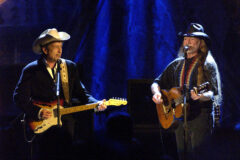Release Date: September 11, 2012
Label: Columbia
Let’s put things in perspective. The title track to Bob Dylan’s 35th (or so) album is a 14-minute, violin-led dirge about the sinking of the Titanic. By my estimation, the song is six seconds longer and two-fifths better than Iron Maiden’s “Rime of the Ancient Mariner.” (Bob’s got better details, plus he uses the word “balustrades.”) It’s also twice as long as Gordon Lightfoot’s “The Wreck of the Edmund Fitzgerald,” but only a little more than half as good — Lightfoot’s song is way hookier. But still, as far as darkly epic, nautically themed mytho-historical epics go, “Tempest” is one of our stronger efforts. It’s also one of the cuddlier moments on this album. Fifty years into his recording career, Bob Dylan is out for blood.
Despite that, he’s still pretty likable. The fondest (and last) song on Tempest is a tribute to John Lennon called “Roll On John.” Bittersweet mandolin and pedal-steel licks sigh at the edge of Dylan’s rueful vocal; the lyrics nod to the Quarrymen and the Beatles’ Hamburg apprenticeship, while also quoting “Come Together,” “A Day in the Life,” and William Blake’s “The Tyger.” “Shine your light,” Dylan sings. “Move it on / Roll on John.” But that warmth is a feint: Dylan slides in lines about Lennon being shot in the back, buffaloed, shackled, and caged, until “Shine your light” starts to sound, heartbreakingly, like a curse. Maybe it is.
Tempest is full of such evil. The rollicking “Early Roman Kings,” built on a stop-time Muddy Waters riff, is a sneer about “lecherous, treacherous” fat cats in sharkskin suits; amid wheezing accordion, Dylan sings, “I can strip you of life / Strip you of breath / Ship you down / To the house of death.” The skittering maracas could be the sands of time, slipping away. The nine-minute “Tin Angel” is a feverish, macabre revenge tale about a lover’s triangle that climaxes with a knife in the belly and blood on the floor. Dusty and malevolent, spiked with brittle banjo, the doomed residents of “Scarlet Town” glumly trudge in from a Cormac McCarthy novel. The nearly Motown-y “Pay in Blood” lives up to its title. “Soon After Midnight” wafts by on a gentle, lolling rhythm and sweetly grainy vocal — until you find out that a girl named Honey took his money and Charlotte is a harlot. And jaunty, genteel leadoff track “Duquesne Whistle” opens with a jazzy, silvery flourish rich with possibility: “Listen to that Duquesne whistle blowing / Blowing like it’s gonna sweep my world away.” (The video shows us a bubbly young lad kidnapped and beaten with a baseball bat, lest you had any visions of daisies in your head.)
As a sonic experience, Tempest kicks most Dylan albums in the cojones. The guitars shine and crackle. The drums thump with a deep heartbeat fullness. The stand-up bass is round and resonant. His voice, too, is recorded perfectly, airy and wry in places, craggy and devilish in others. His grim fatalism is rendered gorgeously and with precision — the lyrically tricky, formally playful albums he’s made since the critical and commercial comeback of 1998’s Time Out of Mind have also been the best-recorded of his career. After a half-century, he’s learned his way around a studio.
Who knows what he’s taken from life? Tempest is the least mischievous album from latter-day Dylan, and the most acrid. The offhand jokes that leavened 2001’s Love and Theft and 2006’s Modern Times are gone. But the role of wizened and gimlet-eyed doomsayer suits him well, better than “Vegas-y showman” or “Dustbowl balladeer” or “amiable Nashville crooner” or whatever he was going for with those black leather vests back in the mid-’80s. I believe him when he’s singing, as he does here, about the perils of flat-chested junkie whores and angels turning away coldly. And there’s plenty of evidence in the world to support the album’s fatalistic point of view. But there’s also reason to believe the world is more than a pit of gloom and sin. Take, for instance, the fact that Bob Dylan is here, making music so troubling and sharp, shining his light.





